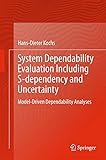System Dependability Evaluation Including S-dependency and Uncertainty [electronic resource] : Model-Driven Dependability Analyses / by Hans-Dieter Kochs.
By: Kochs, Hans-Dieter [author.] .
.
Contributor(s): SpringerLink (Online service) .
.
Material type:  BookPublisher: Cham : Springer International Publishing : Imprint: Springer, 2018Edition: 1st ed. 2018.Description: XXXII, 374 p. 145 illus., 75 illus. in color. online resource.Content type: text Media type: computer Carrier type: online resourceISBN: 9783319649917.Subject(s): Dynamics
BookPublisher: Cham : Springer International Publishing : Imprint: Springer, 2018Edition: 1st ed. 2018.Description: XXXII, 374 p. 145 illus., 75 illus. in color. online resource.Content type: text Media type: computer Carrier type: online resourceISBN: 9783319649917.Subject(s): DynamicsThe book focuses on system dependability modeling and calculation, considering the impact of s-dependency and uncertainty. The best suited approaches for practical system dependability modeling and calculation, (1) the minimal cut approach, (2) the Markov process approach, and (3) the Markov minimal cut approach as a combination of (1) and (2) are described in detail and applied to several examples. The stringently used Boolean logic during the whole development process of the approaches is the key for the combination of the approaches on a common basis. For large and complex systems, efficient approximation approaches, e.g. the probable Markov path approach, have been developed, which can take into account s-dependencies be-tween components of complex system structures. A comprehensive analysis of aleatory uncertainty (due to randomness) and epistemic uncertainty (due to lack of knowledge), and their combination, developed on the basis of basic reliability indices and evaluated with the Monte Carlo simulation method, has been carried out. The uncertainty impact on system dependability is investigated and discussed using several examples with different levels of difficulty. The applications cover a wide variety of large and complex (real-world) systems. Actual state-of-the-art definitions of terms of the IEC 60050-192:2015 standard, as well as the dependability indices, are used uniformly in all six chapters of the book.


There are no comments for this item.